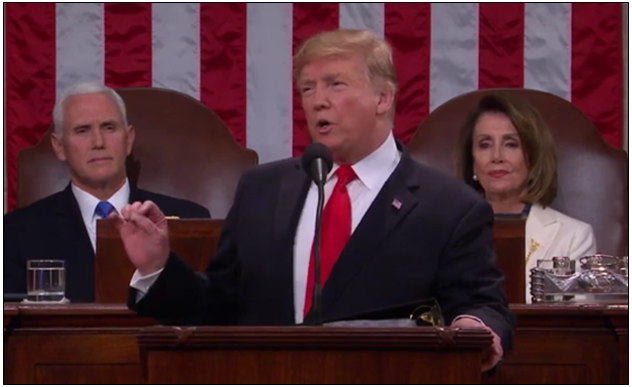Once again, President Donald Trump brought his case for the southern border wall and to address the humanitarian crisis on the border to Congress in his Feb. 5 State of the Union Address, urging bipartisan support for the project.
In the speech, Trump said, “My Administration has sent to the Congress a commonsense proposal to end the crisis on our southern border. It includes humanitarian assistance, more law enforcement, drug detection at our ports, closing loopholes that enable child smuggling, and plans for a new physical barrier, or wall, to secure the vast areas between our ports of entry. In the past, most of the people in this room voted for a wall — but the proper wall never got built. I’ll get it built.”
The rationale for continuing with Congress, even after the partial government shutdown has ended, is simple. Having Congress approve the funding for the wall is the quickest and surest way to ensure that the steel barrier the President is proposing is actually completed and to break ground this year.
The President put the question into moral and human terms, inviting the family of Gerald and Sharon David to the speech. The Davids were murdered in their home in Reno, Nev. by an illegal immigrant. Trump stated, “Not one more American life should be lost because our nation failed to control its very dangerous border. In the last 2 years, our brave ICE officers made 266,000 arrests of criminal aliens, including those charged or convicted of nearly 100,000 assaults, 30,000 sex crimes, and 4,000 killings.”
Yes, the President is retaining the option to declare an emergency and redirect military construction funds to securing the border with his proposed steel barrier. 33 U.S. Code Section 2293(a) provides that “In the event of a declaration of war or a declaration by the President of a national emergency in accordance with the National Emergencies Act [50 U.S.C. 1601 et seq.] that requires or may require use of the Armed Forces, the Secretary, without regard to any other provision of law, may (1) terminate or defer the construction, operation, maintenance, or repair of any Department of the Army civil works project that he deems not essential to the national defense, and (2) apply the resources of the Department of the Army’s civil works program, including funds, personnel, and equipment, to construct or assist in the construction, operation, maintenance, and repair of authorized civil works, military construction, and civil defense projects that are essential to the national defense.”
But, there’s a hitch. Besides a surefire challenge in federal courts, Congress can disapprove the action under the terms of the National Emergencies Act. Surely, the Democratic-led House will do so and whether the Republican-led Senate will do so is a real question in Washington, D.C.
Sen. John Kennedy (R-La.) has predicted that if it came to that, Republicans in the Senate would ultimately back the President, telling CNN, “Let’s see how they vote. If the president does it, I’m willing to bet you a lot of Republicans who are saying it’s a bad idea and he shouldn’t do it, they’ll vote to support him.”
Before they vote, of course, members of Congress should consider that even if such a resolution of disapproval were to pass both chambers, the President would likely veto it, then requiring two-thirds majorities in both houses to override the veto. That’s his trump card.
As for the courts, the grant of authority Congress gives to the President in the National Emergencies Act is broad. 50 U.S. Code § 1621(a) states flatly, “With respect to Acts of Congress authorizing the exercise, during the period of a national emergency, of any special or extraordinary power, the President is authorized to declare such national emergency.”
Such declarations have not been successfully challenged in the past. The law has been used by presidents more than 50 times. Ultimately, it comes down to the President exercising the power that Congress has explicitly granted him. Trump should win that court case, as his powers are at their maximum with such an explicit grant of authority. It’s his sole determination to make under the law, not courts.
Which is why the President’s play in Congress to build the wall makes a whole of lot of sense. Right now, Congress has a bipartisan opportunity to achieve concessions from the President via a negotiation. It shows Trump is willing to compromise, even as he prepares to do everything in his power to protect national security.
But, there’s a time limit. Funding for the government runs out on Feb. 15. Congress has a window right now to make a deal — or not. It’s their choice. After Feb. 15, all bets are off.
If Trump goes the emergency declaration route, there’s no need to negotiate. In the end, it will be Congress’ loss, not Trump’s. The President can redirect the military construction funds, and Congress won’t get anything in return. See what he cares. Either way, Trump gets the wall.
Robert Romano is the Vice President of Public Policy at Americans for Limited Government.







